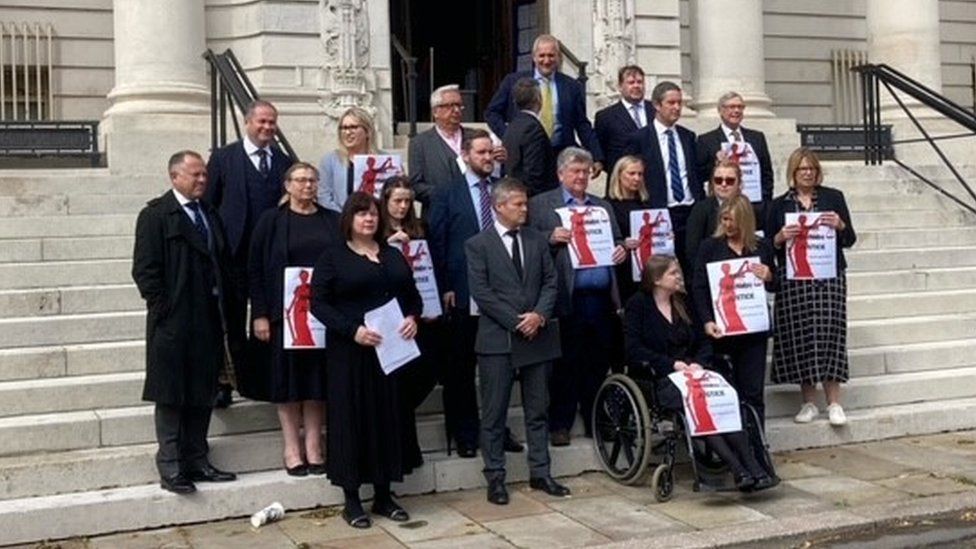Barristers in Wales walk out of courts in row over pay
- Published

Courts across Wales have been brought to a standstill by the first of two days of strike action by barristers in a dispute over pay and conditions.
Lawyers demonstrated outside Cardiff Crown Court, led by one of Wales' most senior barristers Jonathan Rees QC.
The row is over the level of pay given by the UK government to ensure suspects who cannot afford lawyers are properly advised and represented.
Justice Secretary Dominic Raab described the action as "regrettable".
The offer made is 15%, which Mr Raab said would give a typical barrister an extra £7,000 a year.
"We became barristers because we believe in justice, our system exists to ensure the guilty are punished and the innocent are acquitted," Mr Rees said.
"This can only be achieved by ensuring the system is properly funded and the brightest and best are prepared to undertake publicly funded work.
"The Lord Chief Justice himself acknowledges that inadequate fees have been a critical factor in the loss of talented individuals at the criminal bar and the lack of barristers is a major obstacle to our ability to bring down a backlog of nearly 60,000 cases."
Known as criminal legal aid, the system pays for both solicitors and barristers to advise and represent suspects from their police interview through to trial.
Barristers have been rallying outside a number of high-profile courts, including the Old Bailey in London and Birmingham, Manchester, Cardiff and Bristol Crown Courts.
Walking away
Those joining picket lines have been warned they could face disciplinary proceedings for misconduct if they don't turn up to court by the most senior judge in England and Wales, The Lord Chief Justice Lord Burnett.
Barrister Emma Harris said she and her colleagues did not want to strike, but there was deep concern that unless there was major change, the future of the criminal bar was in doubt.
"I came into this job because I had a very firm belief in justice which I still maintain," she said.
"I want to help people, I want to be the voice for people who simply don't have that voice on their own."
But she said it is becoming increasingly difficult to retain good young criminal barristers in the current climate.
The Criminal Bar Association said nearly 300 people walked away from criminal practice last year, with a quarter of specialist criminal barristers leaving in the last five years.
Laura Shepherd became a barrister in 2016 but left criminal law after just five years.
She said the low pay and long hours were the main factor in her decision to change to commercial law.
"Sometimes, if you worked out the hourly rate it was less than the minimum wage," she added.
"It was made more stark by the fact that I'd do other areas of work where that work was easier and I'd get paid more, so it was a no brainer for me.
"Why would I have a worse work balance, a worse annual income... to be paid less made no sense to me."
Mr Raab said: "I encourage them to agree the proposed 15% pay rise which would see a typical barrister earn around £7,000 more a year."
Related Topics
- Published27 June 2022
- Published20 June 2022